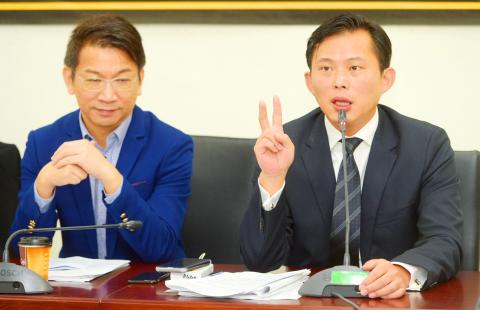The New Power Party (NPP) yesterday proposed an amendment to Article 9 of the National Security Act (國家安全法), which seeks to grant people convicted in Martial Law era courts the right to request a retrial or file an extraordinary appeal.
Unless certain conditions are met, current regulations deny people convicted by a military court over national security issues the right to appeal or request a retrial, which deprives people who might have been persecuted or wrongly convicted of the right to restore their reputation and demand accountability for the government’s abuse of power, the NPP said.
Those conditions include scenarios where new evidence is presented by defendants — which would allow them to request a retrial — and when a legal interpretation is required because different courts handed down conflicting rulings — which demands an extraordinary appeal, NPP Executive Chairman Huang Kuo-chang (黃國昌) told a news conference in Taipei.

Photo: Chang Chia-ming, Taipei Times
These restrictions are outdated and unconstitutional, hampering efforts to promote transitional justice, Huang said.
During the Martial Law era, the government controlled all information making it difficult for some people to prove their innocence, he said.
If passed, the amendment would grant defendants the right to directly ask high courts — which have now taken over cases adjudicated by military courts — for a retrial within five years of its ratification, according to the NPP draft amendment.
The proposal seeks to establish dedicated tribunals at the Supreme Court and high courts, with the Supreme Court in charge of handling appeals of high-court rulings.
Huang asked why Democratic Progressive Party (DPP) lawmakers have not put a transitional justice promotion bill on the legislative agenda, after a legislative review was completed in the plenary session in June.
Saying that transitional justice is a value touted by the DPP administration, Huang asked what the DPP’s motives and concerns were behind its apparent inaction over the bill.

Alain Robert, known as the "French Spider-Man," praised Alex Honnold as exceptionally well-prepared after the US climber completed a free solo ascent of Taipei 101 yesterday. Robert said Honnold's ascent of the 508m-tall skyscraper in just more than one-and-a-half hours without using safety ropes or equipment was a remarkable achievement. "This is my life," he said in an interview conducted in French, adding that he liked the feeling of being "on the edge of danger." The 63-year-old Frenchman climbed Taipei 101 using ropes in December 2004, taking about four hours to reach the top. On a one-to-10 scale of difficulty, Robert said Taipei 101

Nipah virus infection is to be officially listed as a category 5 notifiable infectious disease in Taiwan in March, while clinical treatment guidelines are being formulated, the Centers for Disease Control (CDC) said yesterday. With Nipah infections being reported in other countries and considering its relatively high fatality rate, the centers on Jan. 16 announced that it would be listed as a notifiable infectious disease to bolster the nation’s systematic early warning system and increase public awareness, the CDC said. Bangladesh reported four fatal cases last year in separate districts, with three linked to raw date palm sap consumption, CDC Epidemic Intelligence

Taiwanese and US defense groups are collaborating to introduce deployable, semi-autonomous manufacturing systems for drones and components in a boost to the nation’s supply chain resilience. Taiwan’s G-Tech Optroelectronics Corp subsidiary GTOC and the US’ Aerkomm Inc on Friday announced an agreement with fellow US-based Firestorm Lab to adopt the latter’s xCell, a technology featuring 3D printers fitted in 6.1m container units. The systems enable aerial platforms and parts to be produced in high volumes from dispersed nodes capable of rapid redeployment, to minimize the risk of enemy strikes and to meet field requirements, they said. Firestorm chief technology officer Ian Muceus said

MORE FALL: An investigation into one of Xi’s key cronies, part of a broader ‘anti-corruption’ drive, indicates that he might have a deep distrust in the military, an expert said China’s latest military purge underscores systemic risks in its shift from collective leadership to sole rule under Chinese President Xi Jinping (習近平), and could disrupt its chain of command and military capabilities, a national security official said yesterday. If decisionmaking within the Chinese Communist Party has become “irrational” under one-man rule, the Taiwan Strait and the regional situation must be approached with extreme caution, given unforeseen risks, they added. The anonymous official made the remarks as China’s Central Military Commission Vice Chairman Zhang Youxia (張又俠) and Joint Staff Department Chief of Staff Liu Zhenli (劉振立) were reportedly being investigated for suspected “serious